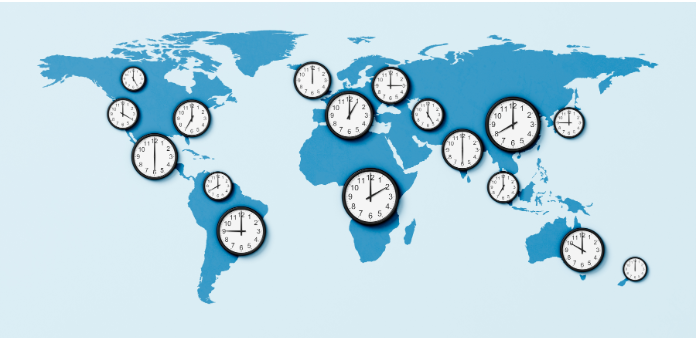So, if you are traveling from New York to Paris, you pass through six time zones (+6 hours). If you plan to stay for a week, you’ve got a problem. All things being equal, it would take you six days to get over your jet lag symptoms, leaving you only one day to enjoy Paris unencumbered by sleep deprivation symptoms before you have to return home. This is especially true because you are traveling East.
Rule #2: Jet lag is much more stubborn when traveling East than when traveling West.
Consider the difference between traveling from California to New York and vice versa. When you travel East from California to New York, you “lose” three hours because it is three hours later in New York. That means when you land in New York at 9 pm, your body thinks it is 6 pm. By the time you get to and settle in at your hotel, it could be 11 pm local time – an excellent time to get to bed so you can start your New York adventure bright and early the next day. But your body thinks it is 8 pm, and you NEVER go to bed that early. If you try to, you will likely become increasingly agitated as time ticks away, and you realize how exhausted you will be the next day. You may not even be able to doze off when your body clock finally says it is bedtime because your brain is frustrated and agitated.
Now flip the trip the other way and imagine traveling from New York to California. This way, you “gain” three hours because it is three hours earlier there. If you land at 6 pm, your body thinks it is 9 pm. But that isn’t a tragedy because almost all of us have eaten a late dinner or stayed up late for something or other. You could go to your hotel, grab a bite, and go to sleep at 10 or 11 p, which your body thinks is 1 or 2 am. Chances are you will conk out immediately. Even if you have an early start the next day and you wake up at 7 am, your body may think it is 4 am, but you have gotten the right amount of sleep. And, of course, feeling good is all about the sleep.
You generally can’t change your travel direction, but you can make a few adjustments before and during your trip to minimize the effects of jet lag and enhance your travel experience.
To Avoid or Minimize Jet Lag:
1. Adjust your sleep schedule before you leave. A week before your trip, start incrementally adjusting your sleep schedule towards the time zone of your destination. If you’re traveling east, try going to bed a bit earlier than usual, and if you’re heading west, go to bed a bit later. A gradual change can help your body start adjusting before you even leave.
2. Stay hydrated even when the odds are stacked against you. Airplanes have dry air, and flying is incredibly dehydrating. But staying hydrated helps your body function better and adjust to new environments faster. Drink plenty of water, and as tempted as you might be, avoid both alcohol and caffeine during your flight.
3. Try to adapt to your new time zone immediately. Once you arrive at your destination, try to follow the local schedule as closely as possible. If it’s daytime, try to stay awake, and if it’s night, try to sleep. To make this easier, see #4 and 5.
4. Expose yourself to natural light. We’ve written about this in many scenarios. Natural light works wonders! In this case, it can help you reset your internal clock. Spend time outdoors during daylight hours in your new destination to help your body adjust to the new time zone quickly.
5. Try a “stimulant” power nap. Long naps are likely to mess up your sleep schedule further. But a 20-minute nap can work wonders to acclimate you to a new time zone. Some sleep experts suggest having a cup of coffee or another caffeinated beverage (not super-caffeinated, like Red Bull, please) and then lying down for a 20-minute nap. It will take about 20 minutes for the caffeine to engage its stimulant effects in your brain. When you wake up from the nap, you will reap the benefits of both the nap and the caffeine to help you stay on your new schedule. The National Sleep Foundation recommends this for anyone who wants to increase alertness during the day.
6. Eat light meals. Heavy meals can make you feel sluggish and disrupt your sleep patterns. Opt for lighter meals, especially during your first days at your destination.
7. Create your comfortable sleeping environment. This is no time to worry about what the hotel thinks about you. Create your best sleeping environment to enhance your chances of sleeping well. Consider the room’s temperature, how much light there is, and how quiet it is. Do you need an extra blanket or pillow? A good sleeping environment can make it easier for your body to relax and adapt to the new time zone.
8. Relax before bedtime. Try relaxing activities before bed, like reading or taking a warm bath. Engaging in calming rituals can help signal to your body that it’s time to wind down and prepare for sleep. Along these lines, some experts suggest considering a melatonin supplement. Supplements are tricky because they are unregulated and may not have the active ingredients they claim to have. But if you have a brand of supplement you trust, it is worth a try. Melatonin is a substance your brain produces that signals it is time to sleep. Melatonin plus a good sleep ritual is a powerful soporific.
The Bottom Line on Jet Lag
Jet lag is one of those good news—bad news things. Generally, if you are traveling, you will see your family, experience something new, or accomplish something on a business trip. But traveling often comes with jet lag, which can really put a damper on a trip. There are a variety of symptoms that come with jet lag, but they all boil down to one thing—disrupted sleep. With a little preparation and a few adjustments, you can optimize your sleep and save your trip.

